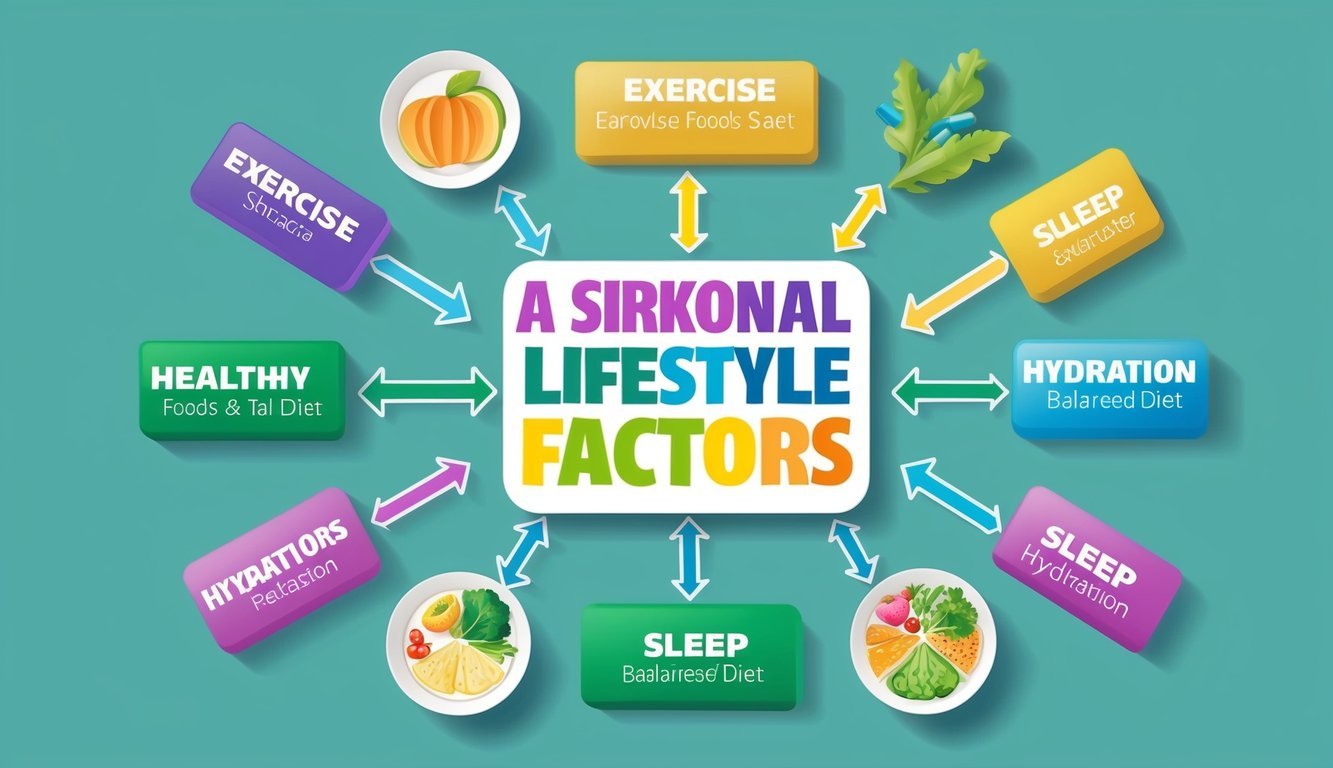Maintaining a healthy metabolism is key to feeling energized and managing weight effectively.
It often feels like a balancing act, especially with busy lifestyles that can disrupt healthy habits. I find simple and sustainable ways to keep my metabolism running smoothly can make a significant difference in my overall well-being.

There are straightforward strategies that I can incorporate into my daily routine.
From adjusting my diet to tweaking my exercise habits, these small changes can lead to better metabolic health without feeling overwhelming.
1) Eat protein-rich foods
Eating protein-rich foods is an easy way to keep my metabolism humming.
Protein helps build and repair muscles, which in turn can boost my metabolic rate.
I love incorporating foods like lean meats, fish, eggs, dairy, and legumes into my meals.
They provide essential amino acids that my body needs for various functions.
When I have a protein source in every meal, I feel fuller longer.
This helps me avoid snacking on less healthy options throughout the day.
Additionally, some studies suggest that my body burns more calories digesting protein compared to fats and carbohydrates.
This is a win for my metabolism!
I also enjoy having snacks like Greek yogurt or a handful of nuts.
These options are not only delicious but also packed with protein.
Keeping protein in my diet is a straightforward way to stay on track with my metabolic health.
2) Incorporate strength training

I’ve found that incorporating strength training into my routine has great benefits for my metabolism.
Lifting weights not only builds muscle but also helps me burn more calories at rest.
Muscle tissue is more metabolically active than fat tissue.
This means that the more muscle I have, the more calories my body burns, even when I’m not working out.
Just one kilo of muscle can increase my basal metabolic rate by around 100 calories a day.
I make sure to mix strength training with my regular workouts.
This combination keeps my routine varied and prevents boredom.
High-intensity strength training sessions can further elevate my metabolic rate, providing lasting benefits.
I typically focus on major muscle groups, including legs, back, and core.
These exercises engage multiple muscles, maximizing my efficiency.
Incorporating resistance bands, free weights, or even bodyweight exercises keeps things interesting and effective.
Making strength training a regular part of my fitness journey has proven to be a smart way to maintain a healthy metabolism.
3) Stay hydrated
I’ve found that staying hydrated is key for my metabolism and overall health.
Water plays a vital role in every cellular function.
Without it, my body doesn’t perform at its best.
I aim to drink enough water throughout the day.
Setting a daily goal helps me track my intake.
Keeping a water bottle close by makes it easier to sip regularly.
I’ve noticed that when I’m well-hydrated, I have more energy.
It also helps improve digestion, which is crucial for metabolism.
Plus, drinking water can sometimes curb my cravings.
Sometimes, I mix things up by adding slices of fruit or herbs to my water.
It keeps things interesting and encourages me to drink more.
Hydration isn’t just about plain water; certain foods like cucumbers and oranges also contribute.
Incorporating these habits has made a difference in how I feel.
Staying hydrated not only boosts my metabolism but also supports my overall well-being.
4) Drink green tea
I enjoy sipping green tea not just for its refreshing taste but also for its potential metabolism benefits.
Green tea contains catechins, which are antioxidants that might support fat oxidation and help with weight management.
Research suggests that drinking green tea can enhance calorie burning, especially during exercise.
It also has L-theanine, an amino acid that may improve brain function.
This makes my tea-drinking moments feel more beneficial.
Incorporating green tea into my routine is easy.
I simply brew a cup in the morning or enjoy it throughout the day.
I appreciate the variety of flavors available, so I can switch things up.
Additionally, green tea is a great way to stay hydrated.
Just be mindful of how much caffeine you consume if you’re sensitive to it.
Enjoying this beverage might be a simple yet effective way to give my metabolism a little boost.
5) Get enough sleep

I can’t stress enough how important sleep is for maintaining a healthy metabolism.
When I don’t get enough rest, my body tends to store more fat rather than burn it.
This is because sleep deprivation can disrupt hormones that control appetite and metabolism.
I’ve found that aiming for 7 to 9 hours of quality sleep each night really makes a difference.
It allows my body to recover and regulate metabolism effectively.
Plus, sleep helps me feel more energetic and motivated to exercise.
If I’m well-rested, I notice I tend to make better food choices too.
Being tired can lead to cravings for unhealthy snacks, which isn’t great for my metabolism.
Creating a bedtime routine or sticking to a sleep schedule has helped me a lot.
Keeping my bedroom cool and dark also makes it easier to fall asleep.
Making these small adjustments contributes to a healthier metabolism.
6) Manage stress levels

I’ve found that managing stress is crucial for maintaining a healthy metabolism.
When stress levels rise, my body produces cortisol, which can lead to weight gain and hinder metabolic processes.
To keep stress in check, I make it a point to take breaks and engage in activities I enjoy.
Whether it’s going for a walk, listening to music, or just relaxing with a good book, these small moments can make a big difference.
Practicing mindfulness and meditation has also helped me greatly.
Focusing on my breathing for a few minutes each day can lower stress and promote a sense of calm.
Physical activity is another great stress reliever.
When I exercise, I feel more energized and my mood improves.
Not to mention, it contributes positively to my metabolism.
Lastly, connecting with friends or family can help alleviate stress.
Talking it out with someone I trust often provides a fresh perspective and can lift my spirits.
7) Eat small, frequent meals

I’ve found that eating small, frequent meals can be a game changer for my metabolism.
Instead of sticking to three big meals, I try to eat smaller portions throughout the day.
This keeps my energy levels steady.
Frequent meals help prevent my body from going into “starvation mode,” which can slow down metabolism.
When I eat regularly, it feels like my body is always ready to burn calories.
Additionally, having smaller meals can reduce my hunger pangs.
When I’m not as hungry, it’s easier for me to make healthier food choices.
This approach works well for managing cravings too.
Sometimes, I pack snacks like nuts or yogurt to keep on hand.
This way, I can quickly grab something nutritious when I’m hungry without overindulging.
It’s a simple change, but it really helps keep my metabolism active.
8) Consume spicy foods

I’ve found that including spicy foods in my diet can be a fun way to give my metabolism a little boost.
Ingredients like chili peppers contain capsaicin, which may help increase metabolic rate.
It’s a simple addition that can spice up my meals.
Whenever I add some heat to my dishes, I notice a kick in my energy levels.
Eating spicy foods can make me feel full quicker, helping with portion control.
Plus, the variety keeps my meals interesting.
I often reach for jalapenos or cayenne pepper when cooking.
These peppers not only add heat but also provide a flavorful punch.
Experimenting with different spices has encouraged me to try new recipes.
Just a reminder, start slow if you’re not used to spicy food.
I’ve learned it’s important to gauge my tolerance.
In the end, I love incorporating spicy ingredients into my meals while enjoying the potential metabolism benefits they bring.
Understanding Metabolism

Metabolism is crucial for our body’s energy management and overall health.
It involves a series of processes that convert food into energy and support various bodily functions.
Let’s explore what metabolism really means and how it impacts our health.
What Is Metabolism?
Metabolism refers to the chemical processes that occur within my body to convert food into energy.
This involves two main phases: catabolism and anabolism.
- Catabolism breaks down nutrients and generates energy.
- Anabolism uses that energy to build and repair tissues.
The rate at which my metabolism works can vary due to factors like age, sex, muscle mass, and activity level.
A higher metabolic rate means I burn more calories at rest and during activity, which is essential for maintaining a healthy weight and energy levels.
How Metabolism Affects Health
A well-functioning metabolism is a key player in my overall health.
If it’s too slow, I might struggle with weight gain, fatigue, and other health issues.
Conversely, a fast metabolism can aid in weight management and energy levels.
There are several health conditions linked to metabolism:
- Hypothyroidism can slow down metabolism, leading to weight gain.
- Hyperthyroidism can speed it up, causing weight loss.
Maintaining a balanced metabolism can help prevent these issues.
Regular physical activity, a healthy diet rich in protein, and proper hydration all support metabolic health, allowing me to feel my best and manage my weight effectively.
Additionally, getting enough sleep and managing stress levels play a crucial role in keeping my metabolism steady.
Certain nutrients, such as iodine and selenium, are essential for supporting healthy thyroid function, which regulates energy production and overall metabolic balance.
By prioritizing these habits, I can enhance my well-being and sustain my energy levels throughout the day.
Factors Influencing Metabolism

Metabolism isn’t just about what I eat; it’s influenced by several key factors.
My genetics and the lifestyle choices I make play a significant role in how efficiently my body burns calories.
Genetic Factors
Genetic factors play a crucial role in determining my metabolic rate.
Some people are naturally predisposed to have faster metabolisms due to their genetic makeup.
This means they burn calories more quickly than others.
Key points include:
- Basal Metabolic Rate (BMR): Influenced by genes, this is the energy my body needs at rest.
- Muscle Mass: Genetics can determine how easily I gain muscle, affecting calorie burn.
- Age: My metabolic rate generally slows down with age, partly due to hormonal changes controlled by my genes.
Understanding my genetic background can help me set realistic expectations regarding my metabolism and weight management.
Lifestyle Choices
My metabolism is significantly impacted by the choices I make daily.
Simple adjustments in my routine can create noticeable changes in how my body processes energy.
Here are some important lifestyle choices:
- Diet: A balanced diet with plenty of protein can boost my metabolism.
- Exercise: Regular physical activity can help increase my metabolic rate. Focus on strength training and high-intensity workouts for the best results.
- Sleep: Adequate rest is essential; poor sleep can slow metabolism.
Implementing healthier lifestyle choices can lead to a more efficient metabolic rate and improved overall health.

